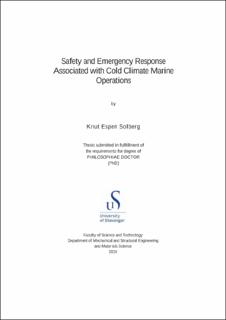Safety and Emergency Response Associated with Cold Climate Marine Operations
Doctoral thesis
Permanent lenke
https://hdl.handle.net/11250/2712375Utgivelsesdato
2020Metadata
Vis full innførselSamlinger
Originalversjon
Safety and Emergency Response Associated with Cold Climate Marine Operations by Knut Espen Solberg, Stavanger : University of Stavanger, 2020 (PhD thesis UiS, no. 493)Sammendrag
This dissertation is developed by GMC Maritime and the University of Stavanger and is part of the industrial PhD program at the Norwegian Research Council.
The aim of the work is to identify the governing mechanisms associated with surviving a marine incident in a cold climate environment. Further, the work was to identify relevant measures mitigating the effects of the cold climate environment. The main focus has been the marine industry. Due to the combined effect of marine safety equipment and the resources delivered by SAR-providers on safety levels, some of these combined effects have been addressed.
Part of the aim has also been to produce new knowledge that questions some of the established truths found in the marine industry. Through international regulatory mechanisms, we wanted to contribute to shape the future regulatory development in a sustainable way. The research has been designed around conducting full-scale experiments, utilizing a multi-discipline approach. Stakeholder involvement throughout the whole process has been important, to highlight the complex structures and ensure a preferred direction and focus.
Surviving a marine incident in a polar environment imposes additional challenges on the crew/passengers on a vessel. These challenges are to be mitigated through improved functionality delivered by the lifesaving appliances. Competence among crew/passengers also proved a vital parameter, strongly affecting the survival rate.
The effect of remoteness influences the available resources and the expected time torescue. The increased expected time to rescue will contribute to exposing the personnel and equipment to the cold climate related challenges for an extended period, which again further affects the survival rate.
Surviving a marine incident in polar waters is possible if the correct mitigation measures are in place. Unfortunately, this will require the vessel operators to invest resources in acquiring the appropriate equipment and knowledge.
One of the governing regulations associated with polar marine activity is the IMO Polar Code, which is a functional set of requirements aimed to mitigate the additional risks associated with Polar marine operations. During the summer of 2019, an interim guideline for the Polar Code was approved by the IMO. This guideline addresses some of the key issues identified in our work as required for survival.
Beskrivelse
PhD thesis in Offshore technology
Består av
Paper 1: Solberg, K. E.; Gudmestad, O. T. (2016) SARex, Assessment of Polar Code requirements through a fullscale exercise. International Symposium on Ice, Ann Arbor, 2016. This paper is not included in Brage for copyright reasons.Paper 2: Kvamme, B. O.; Peechanalt, J; Amith, Y. A. et al. (2017) Heat loss of insulated pipes in cross-flow winds. 36th International Conference on Ocean, Offshore & Arctic Engineering, OAME 2017/ Journal of Offshore Mechanics and Arctic Engineering, https://doi.org/10.1115/1.4041458. This paper is not in included Brage for copyright reasons.
Paper 3: Solberg, K. E.; Brown,R.; Skogvoll, E.; Gudmestad, O. T. (2016) Risk reduction as a result of implementation of the functional based IMO Polar Code in the Arctic cruise industry. The Interconnected Arctic — UArctic Congress 2016, Springer 2017
Paper 4: Solberg, K.E. Implications caused by SARex on the implementation of the IMO Polar Code on survival at sea. Computational methods in Offshore Technology, COTech2017 / IOP Conference Series: Materials Science and Engineering, 276 (012017), https://doi.org/10.1088/1757-899X/276/1/012017
Paper 5: Solberg, K. E.; Gudmestad, O. T. (2017) On exercises for search and rescue operation in the polar region. International Conference on Ships and Offshore Structures, ICSOS 2017. This paper is not available in Brage for copyright reasons.
Paper 6: Solberg, K. E.; Barane, E.; Gudmestad, O. T. (2017) Identification of key elements for compliance of the IMO Polar Code requirement of minimum 5 days’ survival time. 36th International Conference on Ocean, Offshore & Arctic Engineering, OAME 2017. This paper is not in Brage for copyright reasons.
Paper 7: Gudmestad, O. T.; Solberg, K. E. (2019) Findings from two Arctic search and rescue exercises north of Spitzbergen. Polar Geography, 42(3). https://doi.org/10.1080/1088937X.2019.1597394. This paper is not in Brage for copyright reasons.
Paper 8: Jensen, J. E.; Solberg, K. E.; Gudmestad, O. T. (2019) Survival in cold waters - learnings from participation in cold water exercises - a regulatory perspective related to the Norwegian offshore industry. Computational methods in Offshore Technology, COTech2019. This paper is not in Brage for copyright reasons.
Paper 9: Solberg, K. E. (2019) Thermodynamic optimization of life raft designed for polar regions. Port and Ocean Engineering under Arctic Conditions, POAC 2019. This paper is not in Brage for copyright reasons.
Paper 10: Solberg, K. E. (2019) Time to rescue for different paths to survival. Submitted to To be submitted to the Norwegian Maritime Administration and Polar Geography.
Utgiver
University of Stavanger, NorwaySerie
PhD thesis UiS;;493
